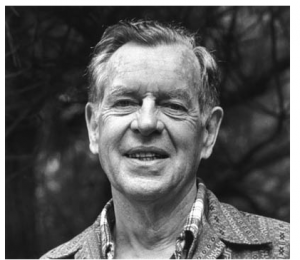Excerpts from “Joseph Campbell – The Power of Myth, with Bill Moyers.”
 MOYERS: But aren’t many visionaries and even leaders and heroes close to the edge of neuroticism?
MOYERS: But aren’t many visionaries and even leaders and heroes close to the edge of neuroticism?
CAMPBELL: Yes, they are.
MOYERS: How do you explain that?
CAMPBELL: They’ve moved out of the society that would have protected them, and into the dark forest, into the world of fire, of original experience. Original experience has not been interpreted for you, and so you’ve got to work out your life for yourself. Either you can take it or you can’t. You don’t have to go far off the interpreted path to find yourself in very difficult situations. The courage to face the trials and to bring a whole new body of possibilities into the field of interpreted experience for other people to experience – that is the hero’s deed.
CAMPBELL: The reference of the metaphor in religious traditions is to something transcendent that is not literally any thing. If you think that the metaphor is itself the reference, it would be like going to a restaurant, asking for the menu, seeing beefsteak written there, and starting to eat the menu.
For example, Jesus ascended to heaven. The denotation would seem to be that somebody ascended to the sky. That’s literally what is being said. But if that were really the meaning of the message, then we have to throw it away, because there would have been no such place for Jesus literally to go. We know that Jesus could not have ascended to heaven because there is no physical heaven anywhere in the universe. Even ascending at the speed of light, Jesus would still be in the galaxy, Astronomy and physics have simply eliminated that as a literal, physical possibility, But if you read “Jesus ascended to heaven” in terms of its metaphoric connotation, you see that he has gone inward – not into outer space but into inward space, to the place from which all being comes, into the consciousness that is the source of all things, the kingdom of heaven within. The images are outward, but their reflection is inward. The point is that we should ascend with him by going inward. It is a metaphor of returning to the source, alpha and omega, of leaving the fixation on the body behind and going to the body’s dynamic source.
MOYERS: Aren’t you undermining one of the great traditional doctrines of the classic Christian faith – that the burial and the resurrection of Jesus prefigures our own?
CAMPBELL: That would be a mistake in the reading of the symbol. That is reading the words in terms of prose instead of in terms of poetry, reading the metaphor in terms of the denotation instead of the connotation.
MOYERS: And poetry gets to the unseen reality.
CAMPBELL: That which is beyond even the concept of reality, that which transcends all thought. The myth puts you there all the time, gives you a line to connect with that mystery which you are.
Shakespeare said that art is a mirror held up to nature. And that’s what it is. The nature is your nature, and all of these wonderful poetic images of mythology are referring to something in you. When your mind is simply trapped by the image out there so that you never make the reference to yourself, you have misread the image.
The inner world is the world of your requirements and your energies and your structure and your possibilities that meets the outer world. And the outer world is the field of your incarnation. That’s where you are. You’ve got to keep both going. As Novalis said, “The seat of the soul is there where the inner and outer worlds meet.”
MOYERS: In classic Christian doctrine the material world is to be despised, and life is to be redeemed in the hereafter, in heaven, where our rewards come. But you say that if you affirm that which you deplore, you are affirming the very world which is our eternity at the moment.
CAMPBELL: Yes, that is what I’m saying, Eternity isn’t some later time. Eternity isn’t even a long time. Eternity has nothing to do with time. Eternity is that dimension of here and now that all thinking in temporal terms cuts off. And if you don’t get it here, you won’t get it anywhere. The problem with heaven is that you will be having such a good time there, you won’t even think of eternity. You’ll just have this unending delight in the beatific vision of God. But the experience of eternity right here and now, in all things, whether thought of as good or as evil, is the function of life.
CAMPBELL: This is an absolute necessity for anybody today. You must have a room, or a certain hour or so a day, where you don’t know what was in the newspapers that morning, you don’t know who your friends are, you don’t know what you owe anybody, you don’t know what anybody owes to you. This is a place where you can simply experience and bring forth what you are and what you might be, This is the place of creative incubation. At first you may find that nothing happens there. But if you have a sacred place and use it, something eventually will happen.
MOYERS: So the experience of God is beyond description, but we feel compelled to try to describe it?
CAMPBELL: That’s right. Schopenhauer, in his splendid essay called “On an Apparent Intention in the Fate of the Individual,” points out that when you reach an advanced age and look back over your lifetime, it can seem to have had a consistent order and plan, as though composed by some novelist. Events that when they occurred had seemed accidental and of little moment turn out to have been indispensable factors in the composition of a consistent plot. So who composed that plot? Schopenhauer suggests that just as your dreams are composed by an aspect of yourself of which your consciousness is unaware, so, too, your whole life is composed by the will within you. And just as people whom you will have met apparently by mere chance became leading agents in the structuring of your life, so, too, will you have served unknowingly as an agent, giving meaning to the lives of others, The whole thing gears together like one big symphony, with everything unconsciously structuring everything else. And Schopenhauer concludes that it is as though our lives were the features of the one great dream of a single dreamer in which all the dream characters dream, too; so that everything links to everything else, moved by the one will to life which is the universal will in nature.
It’s a magnificent idea – an idea that appears in India in the mythic image of the Net of Indra, which is a net of gems, where at every crossing of one thread over another there is a gem reflecting all the other reflective gems. Everything arises in mutual relation to everything else, so you can’t blame anybody for anything. It is even as though there were a single intention behind it all, which always makes some kind of sense, though none of us knows what the sense might be, or has lived the life that he quite intended.
MOYERS: And yet we all have lived a life that had a purpose. Do you believe that?
CAMPBELL: Wait a minute. Just sheer life cannot be said to have a purpose, because look at all the different purposes it has all over the place. But each incarnation, you might say, has a potentiality, and the mission of life is to live that potentiality. How do you do it,’ My answer is, “Follow your bliss.” There’s something inside you that knows when you’re in the center, that knows when you’re on the beam or off the beam, And if you get off the beam to earn money, you’ve lost your life. And if you stay in the center and don’t get any money, you still have your bliss.
MOYERS: I like the idea that it is not the destination that counts, it’s the journey.
CAMPBELL: Yes. As Karlfried Graf Durckheim says, “When you’re on a journey, and the end keeps getting further and further away, then you realize that the real end is the journey.”
The Navaho have that wonderful image of what they call the pollen path. Pollen is the life source, The pollen path is the path to the center. The Navaho say, “Oh, beauty before me, beauty behind me, beauty to the right of me, beauty to the left of me, beauty above me, beauty below me, I’m on the pollen path,”
MOYERS: Eden was not, Eden will be.
CAMPBELL: Eden is. “The kingdom of the Father is spread upon the earth, and men do not see it.”
MOYERS: Eden is – in this world of pain and suffering and death and violence?
CAMPBELL: That is the way it feels, but this is it, this is Eden. When you see the kingdom spread upon the earth, the old way of living in the world is annihilated. That is the end of the world, The end of the world is not an event to come, it is an event of psychological transformation, of visionary transformation. You see not the world of solid things but a world of radiance.








































